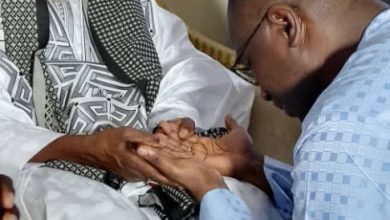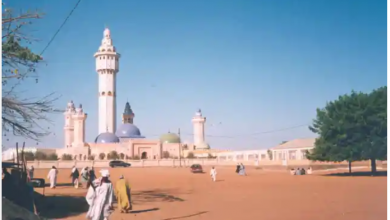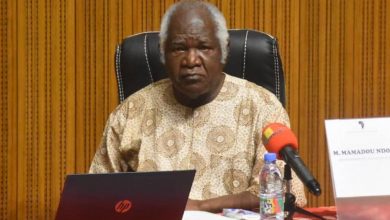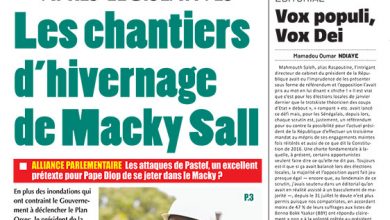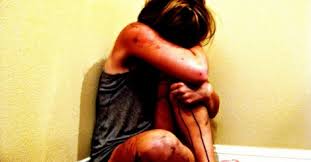TAKEN HOSTAGE, HAÏTI IS DYING, LET’S TAKE ACTION NOW
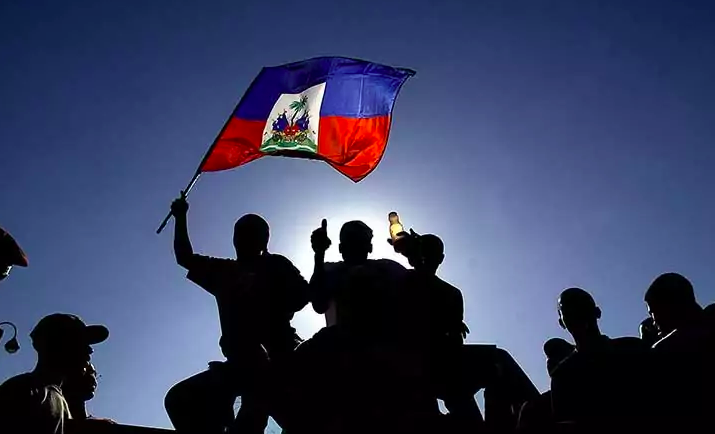

“Beware, my body and my soul,
beware above all of crossing your arms and assuming the sterile attitude of the spectator,
for life is not a spectacle,
a sea of grievances is not a proscenium,
and a man who wails is not a dancing bear.”
Aimé Césaire, from “Return to my Native Land” (first published in 1939)
Taken from the valleys once trodden by Afarensis, or from Zanzibar, Madagascar, Gorée, El Mina, Bimbia, Benguela, Luanda, Cabinda, from the savannahs and forests, Ségou, Benin, Sokoto, the shores of the Congo or the Ubangi, or along the other mighty rivers, Ogooué, Casamance, Niger, Sanaga, having left behind the cosmogony still binding them today to the mother of all continents, enslaved Africans arrived centuries ago in the Americas. In the worst forced migration of all times, the transatlantic slave trade took some of these men, women and children to Kiskeya, also known as Hispaniola, the island in the Caribbean Sea shared today by Haiti and the Dominican Republic.
A land immersed in African traditions, Haiti, the « Pearl of the Antilles » or « Mountain Country » in the Taino language is the nation where enslaved black people have shown the greatest resilience.
On August 14, 1791 in the forest of Bois Caïman, the voodoo priest Dutty Boukman organized a ceremony with the support of the priestess Cécile Fatiman, a “mambo” who performed sacrifices. On that memorable stormy night, enslaved participants solemnly vowed that servitude would be doomed, taking the oath to fight or die. They would later obey the orders of Toussaint Louverture in the revolt masterminded by the remarkable leader. His epic victory – rare, even unique – against one of the worst crime ever committed against humanity, continues to be narrated by many. Toussaint, a strategist and visionary Caribbean islander defeated the stubborn Napoleon, an islander hailing from Corsica. This historic victory was sung by great poets like Aimé Césaire.
On January 1, 2023 the first black republic celebrates the 219th anniversary of its glorious independence. However, the Pearl of the Antilles is dying.
Haiti was obliged to pay a ransom to France as a compensation to French slave owners for lost property, otherwise slavery would be re-imposed and Haiti invaded. In May 2022, the New York Times published a series of well researched articles titled “The Ransom: Haiti Lost Billions”, which narrates this perfidy. Port-au-Prince has so far paid up to $115 billion to France, a staggering sum for Haiti, a ransom that heavily indebted the poor country. Bad governance, corruption and invasions added to an already unbearable burden for the Haitian people. Moreover, the American military occupation, from 1915 to 1934 had a major bank in New York as its main financial backer. In the end, all these factors could only result in a failed state fed for many decades with the adrenaline of violence and the jolts of anarchy and chaos. The ravages of earthquakes, extensive deforestation and the exile of its citizens aggravated Haiti’s fate.
Tormented and neglected, settled in instability, Haiti seems close to sinking. The security situation is dire. Famine affects nearly five million people. Shortly after the 2010 earthquake, an epidemic of cholera imported by UN blue helmets broke out in Haiti when no case had been detected there for more than a century. Faced with these accusations, the then Secretary-General of the United Nations, Ban Ki-moon, had the courage and integrity to issue an official apology. Today, the resurgence of cholera brings more death. On December 21, 2022 speaking to the Security Council, the United Nations Deputy Secretary-General Amina J. Mohammed stated that “Haiti is in a deepening crisis of unprecedented scale and complexity that is cause for serious alarm.”
One of the greatest challenges is that much of Port-au-Prince – a capital of nearly 3 million people – is in the hands of gangs. Their names are drawn from urban tragedies – 400 Mawazos, Chen mechan (Naughty Dog), Cracheurs de feu (Fire Spitters)… The list of gang leaders includes Barbecue, Gaspiyai (Mr. Waste)… Their only motivation seems to be financial and criminal. Gangs have taken the country hostage: they kill; they rape; they steal. Sexual violence is a breeding ground for a future in which society may lack cohesion.
The police are either overwhelmed or complicit. The Haitian army, that not so distant Macoute memory, was dismantled by the international community in the 1990s. Demobilized soldiers were never adequately reinserted into society. The judicial system is moribund. To date, the international community has only been able to finance less than 20% of current humanitarian needs in Haiti, while elsewhere in the world, billions of dollars are generously flowing to alleviate other humanitarian crises.
Haiti, the poorest country in the Western Hemisphere is caught in a recurring nightmare, as if the country is re-experiencing the tales from « The Comedians », a masterpiece published by Graham Greene in 1966. The novel, located under the reign of François « Papa Doc » Duvalier and his Tontons Macoutes, explores the political repression and terrorism that raged in Haiti, and particularly in Port-au-Prince.
However, Haiti should not be seen only as a tragic and brutal tale. The land of Makandal, Toussaint, and Dessalines is blessed with magnificent creativity and sustained by remarkable hope. Haiti has always been culturally bright and intellectually challenging. The iconic Hotel Oloffson in Port-au-Prince once attracted bands such as the Rolling Stones. Thereafter, soul searching Ra-Ra processions by the « roots music » band RAM took over the hotel. Haiti is also the country of the talented musician Wycleff Jean; the band Tabou Combo; or the unforgettable Jean Gesner Henry, aka Coupé Cloué or « the African », the king of kompa mamba, a cool musical style widespread around the world. Writers, playwrights, filmmakers, poets, artists, educators, musicians and craftspeople abound. The superb beauty of the countryside is praised in the books of the Haitian neurologist, novelist and poet Jean Métellus (1937 – 2014), like in Jacmel au crépuscule or Jacmel at dusk. The tragic king Christophe is immortalized in a masterpiece by Aimé Césaire, the literary giant from neighboring Martinique. For more than a century, Haiti also gave birth to magnificent authors and poets: Joseph Anténor Firmin, Louis Joseph Janvier, Justin Lhérisson, Jean-Price Mars, Félix Morisseau-Leroy, Charles Moravia, Frankétienne, Anthony Phelps, Dany Laferrière , Louis-Philippe Dalembert, Edwige Danticat, René Depestre…and many others.
The greatest tragedies, such as the 2010 earthquake, have certainly killed and maimed many, destroying infrastructure. But these tragedies have not shaken the soul of this amazing and endearing country. Like the intrepid Haitian woman, Haiti astonishingly remains standing, and its culture vibrant.
The international community, sub-regional and regional organizations, academia, media, communications gatekeepers, the private sector, the Haitian comprador bourgeoisie: all have a responsibility for Haiti. This is not an easy conversation. Migration issues are a hot topic in most Western countries. In September 2021, images of US guards on horseback armed with whips pushing back Haitian migrants at the border with Mexico caused a great stir around the world. But these whiplashes from the slave trade era cannot rewrite the heroic history written by Haitians with their blood, sweat, tears and courage. Haiti is the only slave-led military uprising that was able to overthrow a slave-holding colonial power. Haitians are very brave people.
The international community was called upon to step in and fight the gangs. Just as the corrugated iron walls of Haiti’s slums will not stop stray bullets, our physical distance from Haiti will not prevent tragedy from piercing our souls and comfort zones. In the light of past failures, one can honestly wonder if a foreign military intervention in Haiti would bring a lasting solution. Either way, inertia is not an option. Any intervention should revisit and learn from history, prioritize security, actively promote and support justice while helping to build trust and good governance. The situation must be tackled as a whole, without delay.
What the international community will do or will not do is critically important. Notwithstanding, we support Haitian citizens who want an end to anarchy and violence, who want justice. To assess the strength and the value of a family, one must observe the solidarity with which it protects the most vulnerable of its members. The first black republic, perhaps the most fragile within the family of Nations, is short of food, drinking water, fuel, peace, justice.
We launch this urgent appeal: let us act now, with a new and genuine benevolence, whatever the risks, and without individual geopolitical intentions. The Haitian populations are in danger. History will not be kind to those who remain inactive or who choose to look elsewhere.
That would be non-assistance to a people in danger.
It is difficult to envisage the resolution of this Gordian knot without outside intervention. The Haitian people will only be able to vote and freely choose their leaders if there is security.
A member of the family of nations is being held hostage by the pitfalls of historical injustices, recurring bad governance and the brutality of armed gangs: the entire family must intervene so that this member is free from the hostage takers as well as from the contingencies of past failures. Haitians would fly with their wings towards the peaks of human development, we sincerely hope.
Sitting idly by is not an option.
Let us therefore gather our forces for a success in Haiti, and as Césaire predicted, there will be « room for everyone at the rendezvous of victory ».
Otherwise, we will all be guilty of failing to assist this heroic people in danger.
Let us respond to the poetic exhortation of Jean Métellus. From his exile a few decades ago, his poem was a beautiful cry, « Au pipirite chantant » or “When the Pipirite Sings.” His lament has not aged a bit. It is the plea from the
Haitian peasant who at the singing pipirite,
despises memory and manufactures projects
Revokes the past braided by plagues and smokes
And from daybreak he tells his glory on the cool galleries of young shoots.
We stand with Haitians. Let us act now. For Haiti, for humanity.
(*) Signatories:
Adama Dieng, initiator of the Op-Ed, is a former United Nations Under Secretary-General. He also served in the UN as former Special Adviser on the Prevention of Genocide and Registrar of the International Criminal Tribunal for Rwanda. He is also a former board member of the International Institute for Democracy and Electoral Assistance.
Macky Sall, President of Senegal, Chairperson of the African Union.
José Ramos-Horta, President of the Democratic Republic of Timor-Leste; co-recipient of the 1996 Nobel Peace Prize.
Moussa Faki Mahamat, Chairperson of the African Union Commission, Former Prime Minister of Chad.
Alpha Oumar Konaré, former President of Mali; former Chairperson of the African Union Commission; former President of the Economic Community of West African States (Ecowas).
Goodluck Ebele Azikiwe Jonathan, Former President of Nigeria; Mediator of the Economic Community of West African States (ECOWAS).
Catherine Samba-Panza, former President of the Central African Republic.
The Right Honorable Michaëlle Jean, former Governor General of Canada, Former UNESCO’s Special Envoy to support reconstruction efforts in Haiti; Also served as Chancellor of the University of Ottawa. Former Secretary General of La Francophonie (OIF).
Phumzile Mlambo-Ngcuka, former Deputy President of South Africa; former Executive Director of UN Women. Former Co-Chair of the UN Senior Officials of African Descent Group (UNSAG).
Epsy Alejandra Campbell Barr, former Vice-President of Costa Rica, President of the Permanent Forum of People of African Descent.
Graça Machel, Chair of the Board, Graça Machel Trust.
Miguel Ángel Moratinos, former High Representative for the UN Alliance of Civilizations; OSCE Former Chairperson-in-Office; former Spanish Minister of Foreign Affairs and Co-operation.
Sir Dennis Byron, former President of the Caribbean Court of Justice; former President of the Commonwealth Judicial Education Institute; former President of the International Criminal Tribunal for Rwanda (ICTR); current Chairperson of the UN Internal Justice Council.
Serge Letchimy, President of the Executive Council of Martinique and former member of the National Assembly of France.
Brig. Mujahid Alam (Retired), Principal at Lawrence College, Ghora Gali, Murree, Pakistan.
Sonia Maria Barbosa Dias, Education Specialist, São Paulo, Brazil.
Mbaranga Gasarabwe, former Deputy Special Representative for the UN Multidimensional Integrated Stabilization Mission in Mali (MINUSMA); former UN Resident Coordinator in Mali; former UN Assistant Secretary-General for Safety and Security.
Souleymane Bachir Diagne, Philosopher; Director of the Institute of African Studies and Professor of French and Philosophy at Columbia University.
Andrew Thompson, Professor of Global Imperial History at the University of Oxford and Professorial Fellow at Nuffield College, Oxford.
Othman Mohamed, former Chief Justice of Tanzania and Chair of the Commission of Inquiry into the death of Dag Hammarskjöld.
Amadou Lamine Sall, Recipient of the 2018 edition of the Tchicaya U Tam’si Prize for African Poetry; Winner in 1991 of the Prix du rayonnement de la langue et de la littérature française, awarded by the French Academy.
Sheila Walker, PhD, Author; Cultural anthropologist and documentary filmmaker, Executive Director of Afrodiaspora, Inc.
Jean-Victor Nkolo, former Spokesperson for three Presidents of the UN General Assembly; Was assigned in ten UN peacekeeping operations, including in Haiti.
Euzhan Palcy, Film director, writer and producer (Martinique, France).
Bacre Waly Ndiaye, Lawyer at the Senegal Bar; Former member of the Truth and Justice Commission in Haiti. Willem Alves Dias, Film editor, Brazil.
René Lake, Journalist and expert in international development.
Doudou Diène, Senegalese jurist; former United Nations Special Rapporteur on contemporary forms of racism, racial discrimination, xenophobia and related intolerance.
Justice Ben Kioko, Former Vice President of the African Court of Human and Peoples Rights.
Aver-Dieng Ndaté, Lawyer at the Geneva Bar, Vice-President of the African Peace Conference.
Carol Christine Hilaria Pounder-Kone, aka CCH Pounder, Actress and philanthropist; art collector; HIV/AIDS activist; co-founder of the Boribana museum in Dakar.
Akere Tabeng Muna, Barrister and International Legal Consultant on Governance and Anti-Corruption; Former President if the Pan African Lawyers Union; Former President of the African Union’s Economic, Social and Cultural Council (ECOSOCC); Former Chair of the African Peer Review Mechanism (APRM) Eminent Persons Panel.



